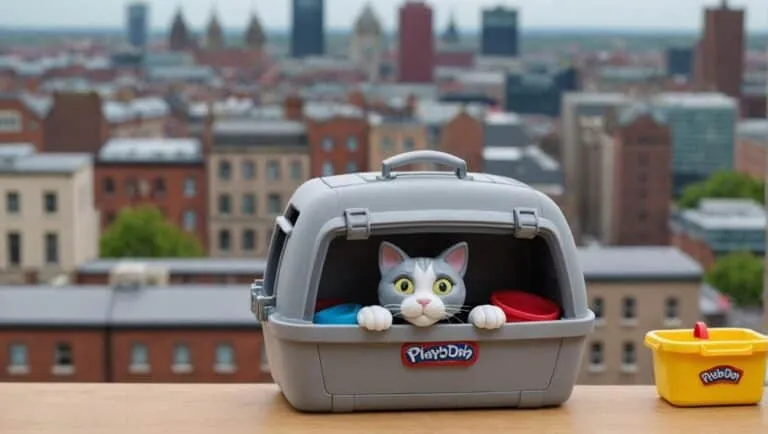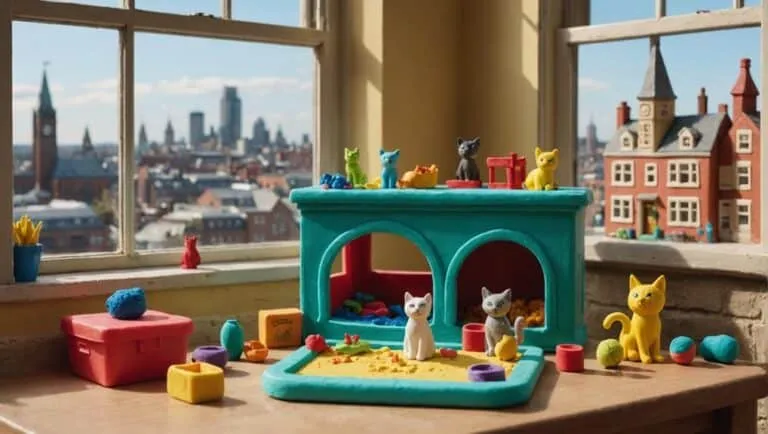The Best Fluffy Pancakes recipe you will fall in love with. Full of tips and tricks to help you make the best pancakes.

You're likely considering rehoming your cat in London due to unforeseen circumstances, and it's vital to understand that you're not alone, with over 10,000 cats being abandoned every year in the city. Behavioral problems, high care costs, and major life changes are common reasons for rehoming. To facilitate a smooth change, it's important to contact local organizations, like Cats Protection, and complete a Cat Profile Questionnaire. You'll also want to consult a veterinarian to assess your cat's medical needs before rehoming. By taking these steps, you'll be better equipped to find your cat a new, loving home – and there's more to learn about the rehoming process ahead.
Why Cats Get Rehomed in London
As you consider rehoming your cat in London, it's crucial to understand the common reasons that lead to this difficult decision.
You're not alone – many cat owners in London face similar challenges that force them to rehome their beloved pets.
From financial constraints to lifestyle changes, there are several factors that might prompt you to find a new home for your cat.
Over 10,000 Cats Abandoned
Rehoming Cats in London:
Over 10,000 Cats Abandoned
Over 10,000 cats are forcibly separated from their owners in London each year, overwhelming local shelters and highlighting a pressing issue in the city's animal welfare landscape.
Common reasons for this large-scale cat abandonment include behavioral problems, high care costs, and major life changes like relocations or alterations in family dynamics. These challenges can make it difficult for cat owners to provide the necessary care and support for their pets. In many cases, allergies affecting household members can contribute to the decision to rehome, emphasizing the need for better education on managing pet-related allergies.
These circumstances often leave cat owners with a heavy heart, as they struggle to cope with the vital choice of giving up their beloved pets.
Unfortunately, many individuals fail to fully explore available options before taking this step, leading to unnecessary abandonments. This underscores the importance of effective resources and support from local organizations, which are essential in facilitating responsible rehoming and preventing abandonment situations.
Owner's Lifestyle Changes Suddenly
Suddenly, you're faced with a challenging decision: rehoming your cat due to unforeseen lifestyle changes that have turned your world upside down. You never thought you'd be in this situation, but circumstances have changed, and you're left with no choice.
Here are some common lifestyle changes that may lead to rehoming your cat:
- Unexpected relocations: A job transfer or a new opportunity forces you to move to a new home that doesn't allow pets or has restrictions that make it difficult to care for your cat.
- Sudden illness: You or a family member falls ill, making it hard to provide the necessary care and attention your cat needs.
- Divorce or relationship breakdowns: A change in your living situation means you can no longer provide a stable home for your cat.
- Increased financial burdens: Unexpected expenses or financial constraints make it difficult to afford your cat's needs, leading you to prioritize your own well-being over your pet's.
How to Rehome a Cat Responsibly in London
Before you start the rehoming process, it's essential to prepare your cat and yourself for this significant change by gathering important information and resources.
Contact your local Cats Protection branch for guidance and assistance to guarantee you rehome responsibly.
To prioritize cat safety, complete a Cat Profile Questionnaire, which provides fundamental information about your cat's behavior, needs, and health status.
Early planning is indispensable, as there may be waiting lists for shelter spaces, and consulting a veterinarian regarding your cat's medical needs is essential.
When surrendering your cat, transport them in a suitable, calming carrier to minimize stress during the changeover.
After rehoming, don't hesitate to reach out to organizations like Cats Protection for continued support and resources to help your cat adjust to their new environment.
London's 24/7 Cat Hotline
Facing a crisis with your cat can be overwhelming.
Through the London 24/7 Cat Hotline, you can access instant support and receive guidance from experienced volunteers who can help you navigate rehoming options or urgent care needs.
This invaluable resource is available round-the-clock, providing reassurance in times of distress.
Emergency Cat Care
When your cat's health takes a sudden turn, London's 24/7 Cat Hotline is just a phone call away, providing you with immediate guidance and support to navigate emergency situations.
You'll receive expert advice on administering first aid, managing injuries, and addressing unexpected illnesses. If your cat is experiencing a behavioral crisis, the hotline's team will guide you through effective behavioral interventions to calm the situation.
The hotline is available 24/7, ensuring you get the help you need when you need it most. By reaching out, you'll not only get immediate assistance but also connect with local charities and rescue organizations that can provide further resources and support for your cat's welfare.
The goal is to empower you with the knowledge and tools to manage emergencies effectively, reducing the likelihood of your cat needing to be rehomed.
Don't hesitate to call – the 24/7 Cat Hotline is here to support you and your feline friend in times of crisis.
Urgent Cat Assistance
If you're dealing with a cat emergency that requires immediate attention, London's 24/7 Cat Hotline is ready to provide urgent cat assistance, connecting you with trained professionals who can guide you through the rehoming process.
When sudden emergencies arise, don't hesitate to reach out for help. The hotline is equipped to handle a range of situations, from behavioral issues to health concerns, and can provide valuable guidance on the best course of action.
In times of crisis, it's reassuring to know that support is just a phone call away. The hotline's trained professionals will assess your situation and recommend the most suitable options for rehoming your cat.
This may include temporary foster care, local shelters, or outreach programs designed to help cats in urgent need. By prioritizing urgent cases, the hotline guarantees that cats receive the care they need, when they need it most.
With London's 24/7 Cat Hotline, you can rest easy that you're not alone in your time of need, and that help is always available to get your cat the assistance they require.
Cat Crisis Support
In times of crisis, London's 24/7 Cat Hotline stands ready to provide you with immediate guidance and support, helping you navigate the complexities of rehoming your cat.
Whether you're facing urgent rehoming situations or behavioral crises, the hotline is available 24/7 to offer expert advice and connect you with local community resources.
You can receive guidance on various concerns, including housing restrictions, financial difficulties related to cat care, and addressing behavioral issues that may lead to rehoming.
The hotline's trained staff will work with you to find a solution, whether it's coordinating temporary foster care arrangements or providing information on cat behavior and local resources.
The hotline's goal is to keep cats out of shelters and guarantee proper handling of rehoming processes.
By calling the hotline, you'll get immediate support and a sense of direction during a difficult time.
Don't hesitate to reach out – with the hotline's help, you can find a solution that prioritizes your cat's well-being and guarantees they receive the care they need.
Alternatives to Rehoming
As you reflect on rehoming your cat, it's important to explore alternatives that can help you keep your pet in its familiar environment.
You may want to look into supporting cat owners, temporary foster care, or local cat sitters that can provide a helping hand during challenging times.
Supporting Cat Owners
You can get help to keep your cat without having to rehome them, thanks to the various alternatives available to support you in your role as a cat owner.
If you're facing financial difficulties, many local charities, including Cats Protection, offer financial assistance options for neutering and veterinary care. This can be a huge relief, allowing you to provide the necessary care for your cat without breaking the bank.
Additionally, resources such as guides on behavior management are available on the Cats Protection website, helping you address common behavioral issues before considering rehoming.
Community support initiatives also aim to provide assistance to keep cats out of shelters, offering advice and help to those struggling with pet-related challenges.
By establishing a strong connection with local animal welfare organizations, you can receive ongoing support and alternatives to rehoming, especially in times of crisis.
With these resources, you can get the help you need to keep your cat happy and healthy, without having to rehome them.
Temporary Foster Care
When facing difficult circumstances that threaten your cat's well-being, temporary foster care offers a lifeline, providing a safe haven for your pet while you address your personal challenges.
As a cat owner, you're not alone in facing distressing situations like domestic abuse or family changes. Local charities and organizations can provide resources and support to arrange temporary foster placements, ensuring your cat's well-being in the meantime.
Foster care benefits include keeping the bond between you and your pet intact while you seek more stable housing or recover from personal challenges. Many foster programs also help socialize your cat, preparing them for eventual adoption if you can't take them back.
To explore temporary fostering options effectively, it's essential to communicate your needs with local cat protection services. Develop a clear communication strategy, outlining your cat's needs, your situation, and the support you require.
Local Cat Sitters
One convenient alternative to rehoming your cat in London is to hire a local cat sitter, who can provide personalized care and attention in the comfort of your cat's own home. This option is ideal for short-term challenges, such as travel or sudden life changes, where rehoming isn't necessary.
By having a sitter visit your cat in their familiar environment, you can reduce stress and anxiety often associated with changes. Professional sitters are experienced in handling various cat behaviors and can cater to specific needs, like administering medications or providing special dietary care. This way, you can rest assured that your cat's emotional health and well-being are protected.
Separation anxiety, a common issue in cats, can be prevented with a sitter's regular visits. Resources like The London Catsitter connect you with vetted professionals, ensuring reliable and compassionate care for your feline friend.
The Rehoming Process
As you prepare to rehome your cat, it's vital to understand the process that lies ahead.
You'll need to take certain steps to guarantee a smooth changeover, from preparing your cat for the journey to exploring the rehoming options available to you.
Preparing Your Cat
You'll want to start preparing your cat for the rehoming process by consulting with your veterinarian to discuss their medical needs and vaccination status. This essential step will guarantee your cat receives any necessary care before moving to a new home.
Next, complete a Cat Profile Questionnaire to provide important information about your cat's behavior, habits, and preferences. This detailed assessment will help find a suitable environment that caters to their unique needs.
When it's time for intake, bring your cat in a calming carrier to minimize stress and guarantee their comfort. Early planning is significant, so contact your local Cats Protection branch to assess options and schedule a time for cat intake.
Don't hesitate to communicate any urgent rehoming situations promptly, so your cat receives the attention and support they need during this change.
Rehoming Options Available
Your rehoming journey begins with exploring the options available to find the perfect new home for your cat.
You can start by contacting your local Cats Protection branch to assess available options and waiting lists for shelter spaces. They'll guide you through the process and help you complete a Cat Profile Questionnaire, which provides essential information about your cat to match them with potential new homes.
You can also consider reaching out to local rescue organizations, which often host adoption events where you can showcase your cat's personality and charm. These events can be a great way to connect with potential adopters who are looking for a cat like yours.
Post-Rehoming Support
After finding a new home for your cat, rehoming organizations provide ongoing support to guarantee a smooth adjustment for both you and the adopter. You'll receive thorough guidance on settling in your new pet, including tips for creating a comfortable and welcoming space.
Additionally, the organization will monitor your cat's behavior as they adjust to their new environment, sharing updates with you as needed. If you have concerns or questions about your cat's behavior or care, you can reach out to the organization for support.
They'll also provide post-adoption training to help you address any issues that may arise. Rest assured, if the adoption doesn't work out, many organizations offer the option to return the cat, ensuring a responsible and supportive shift.
With this level of support, you can feel confident that you're making the right decision for your cat. By choosing a reputable rehoming organization, you'll have peace of mind knowing that your cat is in good hands.
Coping with Guilt and Emotional Aspects
As you navigate the emotional challenges of rehoming your cat, it's crucial to acknowledge that guilt is a natural feeling.
You're not alone in this emotional journey, and there are ways to cope with the emotional aspects of rehoming.
Reducing Stress for Seniors
Rehoming a senior cat can be an emotionally charged experience, filled with feelings of guilt and uncertainty. However, by focusing on the cat's well-being and the potential benefits of a new environment, you can begin to navigate these complex emotions.
As you consider rehoming your senior cat, it's crucial to prioritize their emotional well-being and senior cat care needs. Understanding that older cats may struggle with changes in routine and environment can help you plan a gradual shift to reduce their anxiety.
Engaging in self-care and seeking support from friends or pet welfare organizations can alleviate emotional stress during the rehoming process. Additionally, maintaining a strong communication line with the new owner, including sharing your cat's history and specific needs, can ease worries about their adjustment and happiness.
Finally, prioritizing your cat's comfort with a familiar blanket or toy during the shift can help reduce anxiety and foster a sense of security throughout the process.
Provide a Calm Environment
By taking deliberate steps to create a calm environment, you can considerably reduce your senior cat's stress and anxiety during the rehoming process, ultimately alleviating your own feelings of guilt and emotional distress.
One effective way to do this is by incorporating familiar items, such as blankets or toys, into the new space. This can help your cat feel more secure and ease your feelings of guilt. You can also use pheromone diffusers or calming sprays to create a soothing atmosphere, aiding the emotional well-being of your cat and helping to alleviate your concerns.
Maintaining a routine for feeding, playtime, and interaction can provide a sense of stability for your cat, which in turn can help you cope with your emotional guilt during this period of change.
It's vital to acknowledge your feelings and recognize that rehoming may ultimately lead to a better quality of life for your cat, allowing you to process the emotional aspects healthily. By creating a calm space and incorporating familiar scents, you can guarantee a smoother transition for both you and your cat.
Join a Pet Loss Group
When dealing with the emotional aftermath of rehoming your senior cat, you can find solace and support in a pet loss group, where you'll be surrounded by individuals who understand the complex emotions that come with saying goodbye to a beloved pet.
These groups provide a safe space to express your feelings of guilt, grief, and sadness, allowing you to connect with others who've experienced similar pet grief.
In a pet loss group, you'll find a structured environment where you can openly share your emotions and receive compassion from others who understand the unique bond with your pet.
This emotional support can considerably reduce feelings of isolation, helping you process your loss in a healthy way and learn coping strategies.
Some groups even offer professional facilitators or counselors to guarantee respectful and sensitive discussions.
Final Thoughts
You've made it to the end of this rehoming journey, and it's likely been an emotional ride.
Remember, rehoming your cat is a responsible decision, and it's okay to acknowledge the guilt that comes with it.
By following the steps outlined in this guide, you've given your cat a second chance at a happy life.
Take comfort in knowing you've done what's best for them, and that they'll thrive in their new home.










